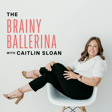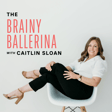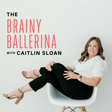
43. Finding Longevity & Wellness in Dance with the Nourished Dancer’s Nicole Sabella
I am thrilled to be joined by Nicole Sabella, a multi-passionate dance professional who spent a decade performing with the Mark Morris Dance Group. Founder of The Nourished Dancer, she is now a dedicated dance educator, certified integrative nutrition health coach, and EFT tapping practitioner.
Nicole opens up about her early dance training, her transition from college into the professional world, and the challenges of making it in New York City. She also dives into how she secured her contract with the Mark Morris Dance Group after initially being told "no," emphasizing the importance of perseverance and staying visible in the dance community.
Key points:
✨ The struggles of transitioning into a professional dance career
✨ The key to longevity in dance and overcoming major injuries
✨ How holistic wellness, nutrition, and mental health impact performance
✨ EFT tapping and emotional regulation techniques for dancers
✨ The inspiration behind The Nourished Dancer and how she helps dancers thrive
Nicole also shares her deeply personal story of how a major health scare led her to retire from performing and fully embrace her work in dancer wellness and coaching.
Whether you're an aspiring dancer, a seasoned professional, or someone passionate about dance and wellness, this episode is packed with insight and inspiration!
Connect with Nicole:
INSTAGRAM: instagram.com/nicole.e.sabella
WEBSITE: thenourisheddancer.com
Links and Resources:
Visit the Ballet Help Desk: https://ballethelpdesk.com/
Get 20% off your first order of ALOHA protein bars: https://aloha.com/BRAINYBALLERINA
More Than a Body by Lindsay Kite PhD and Lexie Kite PhD (affiliate link)
TED Talk by Dr. Lindsay Kite on body image resilience
1-1 Career Mentoring: book your complimentary career call
Let’s connect!
My WEBSITE: thebrainyballerina.com
INSTAGRAM: instagram.com/thebrainyballerina
Questions/comments? Email me at caitlin@thebrainyballerina.com


